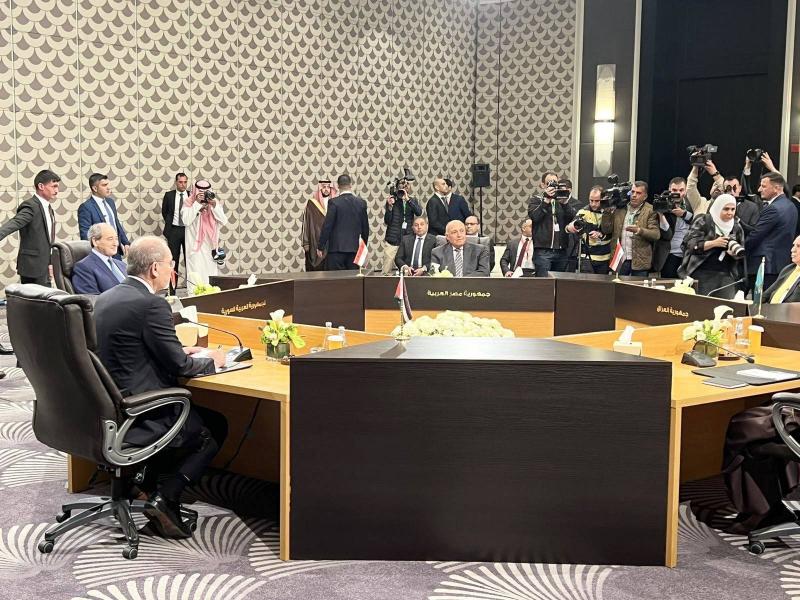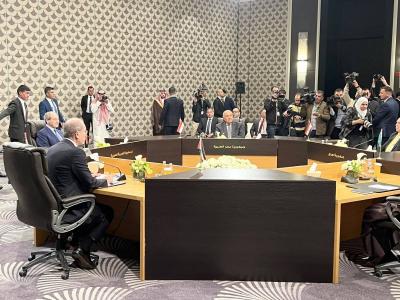The "Amman Statement" regarding Syria's return to the Arab League confirmed today, Monday, the commitment to support Syria in asserting its control over its territory and enforcing the rule of law. It also emphasized cooperation between Damascus, relevant states, and the United Nations in formulating a comprehensive strategy to combat terrorism in all its forms and organizations. The participating countries expressed a desire to engage positively and find a solution that ends the crisis with all its humanitarian, security, and political ramifications. It was agreed that there should be an Arab lead role in addressing the Syrian crisis based on a step-by-step approach in line with Resolution 2254.
Jordanian Foreign Minister Ayman Safadi, at the end of the meeting, noted that the atmosphere was positive, stating, "We were present at the Amman meeting representing ourselves, not as representatives of other Arab countries." He continued, "Any decision for Syria's return to the Arab League should be taken based on the League's working mechanisms. The ministers agreed to form a technical team of experts to follow up on the outcomes of this meeting and define the next steps." Safadi emphasized the necessity of ground steps that would improve the reality in which Syria and Syrians live.
The final statement of the Arab foreign ministers' meeting recommended working to resume the Syrian constitutional committee's activities as soon as possible. Syria agreed to assist in ending drug smuggling across its borders with Jordan and Iraq, according to a statement that sought to outline a roadmap to end the conflict that has persisted for 12 years.
There has been no comment yet from Syrian Foreign Minister Faisal Mekdad.
### Meeting Activities
The meeting of the foreign ministers of Saudi Arabia, Jordan, Egypt, Iraq, and the Syrian state commenced in the Jordanian capital, Amman, to continue consultations regarding Syria's return to the Arab League, with the presence of Syrian Foreign Minister Faisal Mekdad, who arrived today in Amman—his first visit since the outbreak of the Syrian revolution in 2011. Reuters reported that officials participating in the meeting stated, "A group of Arab foreign ministers held a historic meeting with their Syrian counterpart in Jordan today to discuss ways to restore relations with Syria in the context of a political settlement to the ongoing conflict in the country for more than ten years."
This marks the first talks bringing together the Syrian government and a group of Arab states since the decision to suspend Syria’s membership in the Arab League in 2011. Upon his arrival, Mekdad was received by Jordanian Foreign Minister Ayman Safadi, and discussions were held regarding efforts to launch an Arab leading role to achieve a political solution to the Syrian crisis based on the Jordanian initiative and other Arab proposals. The two ministers also discussed various bilateral issues including border security, drug smuggling, water, and refugees.
The meetings of the foreign ministers are a continuation of the consultative session for the Gulf Cooperation Council member countries, Jordan, Iraq, and Egypt, which was hosted by Saudi Arabia in Jeddah mid-April. The aim is to build on the communications these countries have had with the Syrian government concerning their proposals and the Jordanian initiative to reach a political solution to the Syrian crisis.
Arab ministers participating in the Jeddah meeting agreed to play a leading Arab role in efforts to end the crisis in Syria. Days after the meeting, Saudi Foreign Minister Prince Faisal bin Farhan visited Damascus, marking the first official Saudi visit to Syria since the rupture in relations with the onset of the conflict 12 years ago. Prior to that, Mekdad visited Jeddah, marking his first official visit to Saudi Arabia since the breakdown of relations at the beginning of the conflict in Syria. Mekdad had also visited Algeria and Tunisia, where agreements were made to restore diplomatic relations between the countries.
Several Arab countries, led by Saudi Arabia, had closed their embassies and withdrawn their ambassadors from Syria, protesting the Syrian regime's handling of the "popular uprising" that evolved into a violent conflict, during which Saudi Arabia and other Arab states supported Syrian opposition factions. The Arab League suspended Syria's membership in November 2011. In this context, Arab League Secretary-General Ahmed Aboul Gheit previously stated that "there should not have been a rush to suspend Syria's membership in the Arab League."




